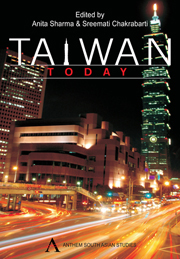Book contents
- Frontmatter
- Contents
- Acknowledgements
- Contributors to this Volume
- Acronyms and Abbreviations
- Foreword
- Introduction
- 1 Who are We? Identity in Transition
- 2 Taiwan: Yearning for an Identity
- 3 The Implications of Direct Flights: Beijing in Taiwanese Politics
- 4 Kuomintang, Democratization and the One-China Principle
- 5 The Deepening and Consolidation of Democracy in Taiwan
- 6 India and Taiwan: Bolstering Complementarity in Information Technology
- 7 Asian Regional Economic Integration and Taiwan–India Economic Relations
- 8 The Taiwan Factor in Sino–Indian Relations
- 9 Japan's Triumphant Diplomacy in Taiwan in 1874
- 10 A Study of the Cultural and Educational Exchanges between Taiwan and India, 1995–2006
- 11 Between Two Worlds: A Survey of Education in Taiwan
- 12 Female Immigrants, Social Capital and Public Sphere in Taiwan
- 13 Information Technology and Gender: Taiwan and India
- 14 Tzu Chi: A Case Study of Engaged Buddhism in Taiwan
- 15 Master Hsing Yun of Fo Guang Shan and the Development of Humanistic Buddhism
- 16 The Heritage and Innovation of Chan Paintings in Taiwan
- 17 Taiwan in World Architecture: A Historical Perspective
- Afterword
12 - Female Immigrants, Social Capital and Public Sphere in Taiwan
Published online by Cambridge University Press: 05 March 2012
- Frontmatter
- Contents
- Acknowledgements
- Contributors to this Volume
- Acronyms and Abbreviations
- Foreword
- Introduction
- 1 Who are We? Identity in Transition
- 2 Taiwan: Yearning for an Identity
- 3 The Implications of Direct Flights: Beijing in Taiwanese Politics
- 4 Kuomintang, Democratization and the One-China Principle
- 5 The Deepening and Consolidation of Democracy in Taiwan
- 6 India and Taiwan: Bolstering Complementarity in Information Technology
- 7 Asian Regional Economic Integration and Taiwan–India Economic Relations
- 8 The Taiwan Factor in Sino–Indian Relations
- 9 Japan's Triumphant Diplomacy in Taiwan in 1874
- 10 A Study of the Cultural and Educational Exchanges between Taiwan and India, 1995–2006
- 11 Between Two Worlds: A Survey of Education in Taiwan
- 12 Female Immigrants, Social Capital and Public Sphere in Taiwan
- 13 Information Technology and Gender: Taiwan and India
- 14 Tzu Chi: A Case Study of Engaged Buddhism in Taiwan
- 15 Master Hsing Yun of Fo Guang Shan and the Development of Humanistic Buddhism
- 16 The Heritage and Innovation of Chan Paintings in Taiwan
- 17 Taiwan in World Architecture: A Historical Perspective
- Afterword
Summary
INTRODUCTION
In the past 15 years, Taiwan has seen an influx of female immigrants through marriage from South East Asia and China. The enormous size and cultural diversity of the group has directly challenged both the society and the government. In a state which has not reviewed its Nationality Act for 70 years and had no Immigration Act before 2003, female immigrants have emerged to formulate their own voices and press their demands onto national debates.
This paper discusses the organizing efforts of female immigrants. We observe the emergence of social capital through trust building and networks among female immigrants. In the patterns of immigration policy changes, we observe the participation of female immigrants in national debates to re-demarcate the boundary of the private and the public.
FEMALE IMMIGRANTS IN TAIWAN
It was only in 1990 that the central government statistical data included the number of immigration spouses. There were 306,700 female immigrants in 2003, the majority being females, mostly from China and South East Asia. International marriages had increased significantly after 1998. In 1998, 16 per cent of the 145,976 Taiwanese registered marriages were with foreigners. The proportion doubled to reach 32 per cent in 2003.
In 2003, 28 per cent of the 171,483 marriages in Taiwan involved female immigrants. In other words, in every three newly married couples, there was one cross-cultural marriage.
- Type
- Chapter
- Information
- Taiwan Today , pp. 154 - 173Publisher: Anthem PressPrint publication year: 2010



